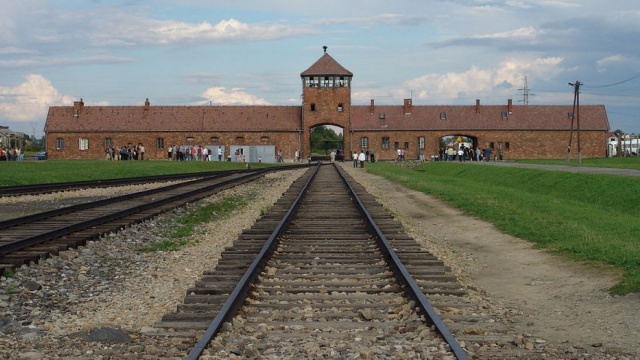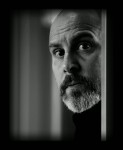

Deacon-structing life
Deacon Pedro
Sunday, June 28, 2015

This is a reflection for the 13th Sunday in Ordinary Time, year B. The readings are Wisdom 1:13-15, 2:23-24; Psalm 30; 2 Corinthians 8:7, 9, 13-15 and Mark 5:21-43.
God did not make death. That’s what I kept thinking last Saturday. You see, I was in Poland and last Saturday I had the chance to spend the day at Auschwitz-Birkenau extermination camps. All I kept thinking was, “God did not make death.” But there was a lot of death at Auschwitz.
Between 1940 and 1945, some 1.2 million men, women and children were brought to the extermination camps of Auschwitz and Birkenau in Poland. Of these, 90% were killed and of those who were killed, about 90% were Jews. People would be brought to Auschwitz in box cars (for cattle). When they arrived, they would be forced off the trains and separated by gender: men to one side and women to the other. Then they would be separated again: those who were deemed suitable for work and those not suitable for work. If you were found not suitable for work, you would be sent directly to the gas chamber. 75% of the people who arrived in Auschwitz never stayed there; they went straight from the train into the gas chamber. Among them, a Jewish woman converted to Catholicism by the name of Edith Stein and her sister Rosa. Edith Stein was a Carmelite Sister and is now known as St. Teresa Benedicta of Cross.
Of the 25% who were found suitable for work, the average stay was 3 months. The number one cause of death (besides gassing) was starvation. I don’t have to tell you the cruelty, horror and inhumanity that went on at Auschwitz and other camps. I don’t need to tell you all the horrible inhumanity and suffering that still goes on every day right here in our streets, but also in the Middle East because of ISIS and in Uganda because of Joseph Kony, and also in so many other places because of human cruelty.
Because of sin. God is not the author of death nor he delights in death.
There was a lot of death at Auschwitz, but God did not make death. That is why Jesus consistently fought against sickness and death. I used to think that it’s not possible that Jesus healed everyone he met. We only hear those stories in the Gospels, but Jesus didn’t heal everyone. I don’t think that anymore. We only hear stories of people being healed in the Gospels because Jesus healed everyone! Everyone who comes to Jesus and touches the hem of his garment or pleads to him for their sick child receives a healing. Everyone who meets Jesus is healed. But it’s not always easy to see the healing and not everyone gets healed physically. That’s because God in his wisdom and awesome majesty is working to get us to Heaven. This life is but a rest stop; we are but pilgrims on a journey. God is healing us so that we can have eternal life. We believe that death is a consequence of sin, but our Faith also teaches that death is a solution to sin – because once we die to this life and we are finally home with the Father, we will sin no more. That’s our faith.
But still, walking through Auschwitz last Saturday, it was hard not to question faith. Nazi extermination camps didn’t just kill 6 million Jews; they also killed some 7 million non-Jews, including almost two million Polish Catholics, some three million Soviet Prisoners of war; over 1 million Gipsies, 200,000 people with disabilities and thousands of people from other ethnic and religious minorities including thousands of Catholic priests and religious. What’s worse is that for many, places like Auschwitz killed God, because it killed faith. Walking through Auschwitz last Saturday, it was hard not to wonder where God was.
God did not make death. God is the God who takes on our suffering. Where was God at Auschwitz? He was on the train, herded like cattle. He was there holding the hand of a little girl as they were taken into the extermination chamber. Where was God? He was on the Cross. God did not make death. God is the God who takes our sickness and our death. He dies so that death can be no more. St. Paul tells us that death has no victory (1 Cor 15:55) and that the last enemy to be destroyed is death (1 Cor 15:26). Well, the battle has been won. Death is no more. Jesus Christ has destroyed death. #LoveWins
God is not the author of death. God is the author of life. God is present in every moment of life. Where was God at Auschwitz? He was there in the small act of kindness; the encouraging smile; the strengthening word. He was there in that small piece of smuggled dried bread so that someone could eat. God was present in every heroic act of love, the least of which was the final act of St. Maximilian Kolbe who offered to take the place of a man, a stranger, condemned to death by starvation so he could have the opportunity to one day go home and be with his wife and children. St. Maximilian Kolbe gave his life and that man did survive to go home to be with his wife and children.
God is not the author of death. God is the author of life and we too are called to be authors of life. In everything we do and say, we must always give life. We go to Mass to receive the Author of Life in the Eucharist so we can go out there and give life to others. At the end of the day when you do your Examen, ask yourself two questions: "Who did I give life to today?" and "How did I give life today?" We are called to give life in everything we say and do; St. Paul tells the Corinthians that if they can, they should support the Church in Jerusalem (1 Cor 8). That’s a way to give life. Last week Pope Francis released an encyclical, Laudato Si, on the care of our common home; it’s about caring for creation. It’s about giving life. It's not just about trees and whales or protecting lakes and the ozone layer, although that is important. Laudato Si is about respecting all creation.
This week's episode of Creation is titled Respect. If our call to care for the environment begins with a sense of wonder (as we learned in Episode 1) and humans have a special place in the created world (as we learned in episode 2), what does it mean to "respect" creation? I'd like you to watch episode 3, but I will give you a hint: Respect means recognizing the inherent dignity of all creation. That means that when we respect, we give life. [Watch Creation: Respect, this Tuesday, June 30th at 8:30pm ET.)
Giving respect means giving life. It means defending and protecting all human life from conception to natural death. It means defending and protecting marriage and family. It means working for social justice and for the dignity of all workers; for the poor and those in the peripheries. We are called to work for life because God is the God of life.
God did not make death. Everything that comes from God is life. There is a song by Christian singer/songwriter Laura Story called Blessings. In it she sings:
We pray for blessings, we pray for peace Comfort for family, protection while we sleep We pray for healing, for prosperity We pray for Your mighty hand to ease our sufferingWe pray for wisdom, Your voice to hear We cry in anger when we cannot feel You near We doubt Your goodness, we doubt Your love As if every promise from Your Word is not enoughAnd all the while You hear each desperate plea And long that we'd have faith to believe'Cause what if Your blessings come through raindrops What if Your healing comes through tears? And what if a thousand sleepless nights Are what it takes to know You're near?And what if trials of this life Are Your mercies in disguise?When friends betray us, when darkness seems to win We know that pain reminds this heart That this is not our home.
This is not our home because there is death in this life and we belong with God who did not make death. Our home is with God, the Author of Life.
-
Photo credit: The main gate at the former German Nazi death camp of Auschwitz II (Birkenau). Michel Zacharz AKA Grippenn[1] - Own work.
 Every week, Deacon Pedro takes a particular topic apart, not so much to explore or explain the subject to its fullness, but rather to provide insights that will deepen our understanding of the subject. And don’t worry, at the end of the day he always puts the pieces back together. There are no limits to deaconstructing: Write to him and ask any questions about the faith or Church teaching:
[email protected] @deaconpedrogm
--------------------------------
Every week, Deacon Pedro takes a particular topic apart, not so much to explore or explain the subject to its fullness, but rather to provide insights that will deepen our understanding of the subject. And don’t worry, at the end of the day he always puts the pieces back together. There are no limits to deaconstructing: Write to him and ask any questions about the faith or Church teaching:
[email protected] @deaconpedrogm
--------------------------------
We pray for blessings, we pray for peace
Comfort for family, protection while we sleep
We pray for healing, for prosperity
We pray for Your mighty hand to ease our suffering
All the while You hear each spoken need
Yet love us way too much to give us lesser things
'Cause what if Your blessings come through raindrops
What if Your healing comes through tears?
What if a thousand sleepless nights
Are what it takes to know You're near?
What if trials of this life
Are Your mercies in disguise?
We pray for wisdom, Your voice to hear
We cry in anger when we cannot feel You near
We doubt Your goodness, we doubt Your love
As if every promise from Your Word is not enough
And all the while You hear each desperate plea
And long that we'd have faith to believe
'Cause what if Your blessings come through raindrops
What if Your healing comes through tears?
And what if a thousand sleepless nights
Are what it takes to know You're near?
And what if trials of this life
Are Your mercies in disguise?
When friends betray us, when darkness seems to win
We know that pain reminds this heart
That this is not, this is not our home
It's not our home
'Cause what if Your blessings come through raindrops
What if Your healing comes through tears?
And what if a thousand sleepless nights
Are what it takes to know You're near?
What if my greatest disappointments
Or the aching of this life
Is the revealing of a greater thirst
This world can't satisfy?
And what if trials of this life
The rain, the storms, the hardest nights
Are Your mercies in disguise?
Related Articles:
<<













